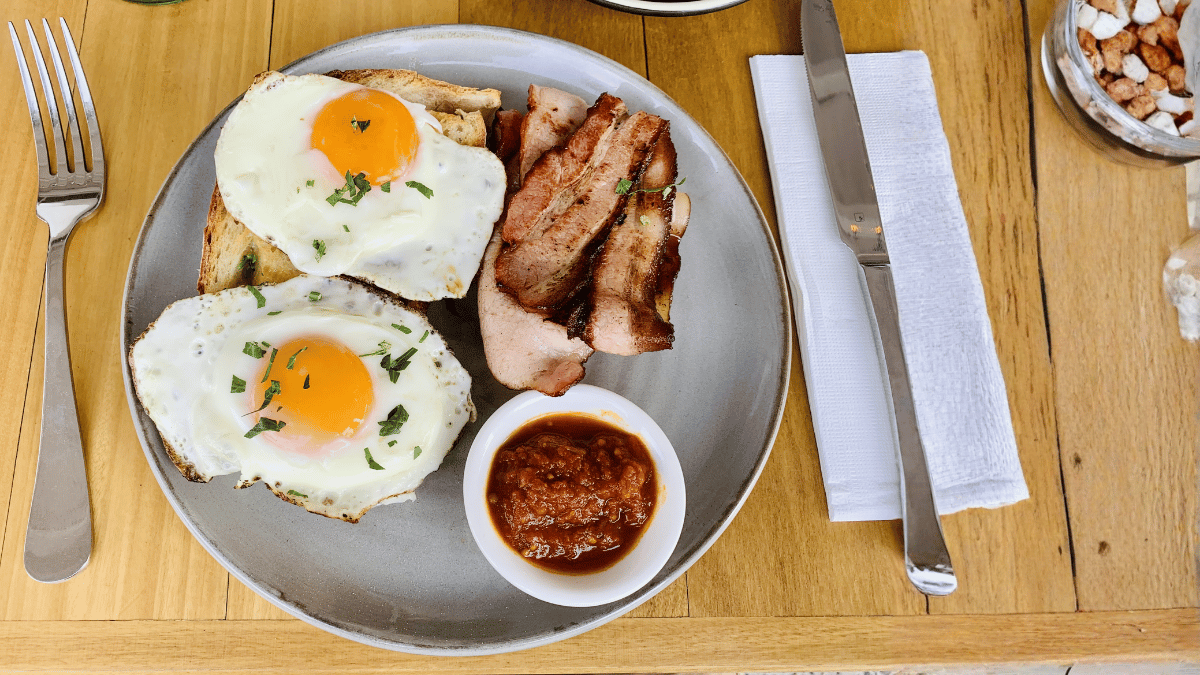I used to think a good morning breakfast meant bacon, buttered toast, and an egg. Its the idea of a quintessential american breakfast. But to me, this was nostalgia, and an idea of a beginning a perfect day. And along with that sugary coffee, this was beyond perfect. But somewhere align the way, the egg was thrown under the bus. It was painted as a ‘heart-clogging’ high cholesterol time bomb, which was directly going into the blood stream. Turns out, I was just hanging out with the wrong crowd. Science now says, its the butter, and bacon, who deserve that side-eye and not the egg.
What’s behind this shift? It turns out our bodies are smarter cholesterol managers than we once believed. The cholesterol you eat from eggs doesn’t automatically translate to high cholesterol in the blood. Your liver plays a major role in regulating it, responding more strongly to saturated fat than to dietary cholesterol itself. That puts processed meats and creamy spreads squarely in the spotlight as the real sources of trouble.
The Science Behind the Plate
Saturated fats-found abundantly in bacon, butter, and certain fried foods-stimulate your liver to produce extra LDL, the so-called “bad” cholesterol. Over time, this can lead to the buildup of fatty deposits in your arteries, narrowing the passagrways and stressing the heart.
A single slice of bacon, rich in sodium and fat, may not seem like much, but it can quickly add up, especially if you’re grabbing it most mornings. Butter, while natural, is about half saturated fat; paired with refined white toast, it spikes blood sugar without offering much fiber or nutrient balance. That’s a double hit-poor lipid control from the fat, and unstable energy from the simple carbs.
Eggs, however, tell a different story. With six grams of high-quality protein, essential amino acids, and nutrients like choline, vitamin D, and B12, eggs serve as compact nutrition powerhouses. Studies show that, for most healthy adults, enjoying an egg a day-or up to seven or eight per week-doesn’t raise heart disease risk. Context, as the saying goes, makes all the difference.
Timing the Habit Right
The rhythm of when you eat matters almost as much as what you eat. A balanced, protein-rich breakfast helps support your metabolism and blood sugar stability throughout the morning. Eating an egg alongside fiber-rich foods-think avocado toast on whole-grain bread or eggs over sautéed greens-helps prevent mid-morning crashes.
I learned this the practical way. After years of late, heavy breakfasts, I began shifting my egg meal earlier in the day with a piece of grainy toast and a cup of black coffee. The difference in energy was striking-I felt alert, steady, and less drawn to the mid-afternoon vending machine. As people often say, sometimes you need to “bite the bullet” and change the routine to feel the results.
Avoid pairing eggs with foods heavy in saturated fats first thing in the morning, especially if your schedule keeps you largely sedentary until noon. High-fat, processed meals early in the day can stall digestion and cloud cognitive sharpness. Evening bacon breakfasts (a trend born from night-shift life or late-night diners) can also disrupt overnight digestive rest and elevate morning sluggishness.
How It Supports Your Body
Your digestive system and your heart are more linked than many people realize. A gut-friendly, lower-saturated-fat breakfast helps reduce inflammation and keeps the microbiome balanced. Fiber from whole grains and plant foods feeds the “good” bacteria that support metbolic function and mood regulation. Meanwhile, steady blood sugar and balanced fats allow your body to produce consistent energy without the hormonal rollercoaster of spikes and crashes.
Over time, these small shifts help the body better regulate cortisol and melatonin-hormones that connect stress levels, sleep quality, and immune strength. By giving your metabolism a cleaner start each morning, you’re also giving your heart and brain a calm, consistent rhythm to follow.
A Practical Morning Guide
- Eggs: One or two per sitting, ideally boiled, poached, or lightly scrambled in olive oil rather than butter.
- Toast: Choose whole-grain or sprouted bread instead of white, topping it with avocado, tomato, or a drizzle of olive oil instead of butter.
- Protein balance: For satiety, pair with a side of Greek yogurt or a few nuts instead of bacon or sausage.
- Drinks: Water with a squeeze of lemon or a small coffee-just be mindful that caffeine after 3 p.m. can still interfere with sleep patterns.
- Habit rhythm: Eat within an hour of waking to spark metabolism and avoid delaying breakfast until mid-morning, which can promote overeating later.
Some people might feel mild digestive discomfort when increasing eggs or fiber-rich foods suddenly. If you have digestive issues, gallbladder problems, or are under medical dietary advice, start slow and consult a healthcare professional. As with most nutrition adjustments, moderation keeps the body cooperative.
Build a Calm, Consistent Routine
It’s easy to get swept up in social media myths about “supefoods” or “quick fixes.” The real power lies in balance-simple eating patterns that align with your daily rhythm. Eggs aren’t the villain they were once made out to be; they just got caught keeping the wrong company.
Instead of ditching them, refine what sits beside them. Try replacing bacon weekends with avocado-salsa mornings or swapping butter for olive oil blends. These small steps may seem modest, but they stack up with time. As one of my mentors used to say, “Consistency beats intensity every single time.”
In the long run, breakfast isn’t about cutting joy from the table-it’s about filling your morning with foods that quietly nourish your energy, balance your body’s chemistry, and set the tone for the day ahead. With a calm, mindful routine, even the simplest egg can be part of a heart-healthy, steady lifestyle-without losing any of the comfort that makes breakfast worth waking up for.

